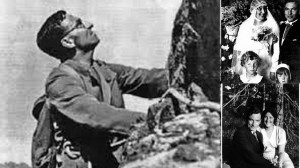William Jervis, known simply as "Willy", was born in Naples in 1901 from a family of British mariners. He graduated in engineering in 1926, After a few years in the army he was hired by the Italian company Olivetti. Fu, always, an active exponent of the Waldensian community and avid mountain climbing. After the September 08 1943, Armistice Day, Willy joined the partisan movement in the area of Ivrea, where he could take advantage of both the knowledge of English, maintaining relations with allies, both his skills as a Mountaineer. Given the climate of suspicion towards all those who had not deployed openly in favour of fascism, on the advice of Mr. Olivetti, Jervis moved to val Pellice, in the province of Turin, where he still resides the largest Waldensian community of Italy and where Willy was able to continue its activities in the resistance.
The March 11 1944 Willy was arrested, randomly, by s. s.. near the bridge of Bibiana: the military understood immediately that you have in your hands a major exponent of the partisan struggle, because of the material of sabotage and military documents that Willy was carrying. Once translated into prison exposed him to atrocious tortures. Despite the suffering, Jervis did not leave out any type of information, that could jeopardize the companions and the partisan struggle. It is important to remember that at that time Willy was already husband of Lucilla and father of three young children, Giovanni, Gladness and Paola, that makes it even more stoic human behavior.
Pending the order of shooting, Willy lived for five months suspended between life and death, poised between monstrous upcoming executions and tortures. During this period, Jervis, Thanks to a prison guard compliant, entertained secret correspondence with his wife. The letters were collected, today, in a book entitled "a tenacious wire". Here are some lines, representing the photograph of those moments of pain and sorrow:
“I'm afraid he's played my last hour. Faith does not abandon me and my last thought will be for you my dear! I was taken with other, put the wall, tied hands. Then they put me in a cell waiting. I make no illusion and I pray to God to give me strength to you consolation. I am calm for me but what anguish for you! How many things I want to say. You know my love for you and the kids. God bless and look! We are sure that there”.
On the night of 4 and the 5 August Willy and other four partisans were transported, by German soldiers, in piazza di Villar Pellice and shot: Jervis's body was tied to a chariot and dragged through the streets of the country; Finally, his body was hanged to a tree and left her there for days, for public ridicule. The Nazi action was a warning to the villagers to stop, immediately, every action and form of resistance. This did not happen, Indeed the example of Jervis convinced partisans to insist in the resistance, actively supporting the allies.
The last words of Jervis, found engraved with a PIN in the Bible, single piece of comfort during suffering in prison and for this evidence of the recognition of the corpse, were: “Not piangetemi, don't call me poor; I die for serving an idea”.
To the memory of William Jervis are now dedicated two huts, one in alta val Pellice. Willy Jervis was awarded the gold medal for bravery. of him, today, remains a faint tracing in texts dealing with Resistance, too little for someone whose life has been devoted to ideals such as freedom, Defense and homeland and for which he sacrificed his own life.
Maria
